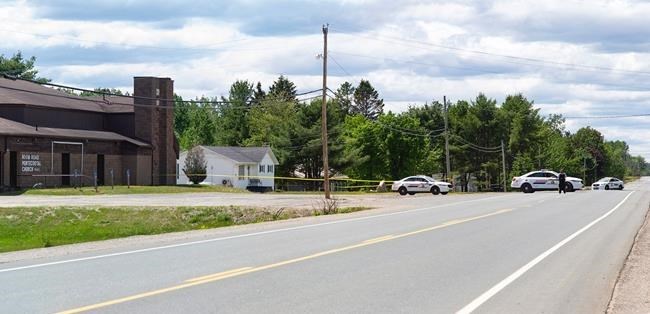
Members of the RCMP control the scene where a man was shot on Friday night, near Miramichi, N.B. on Saturday, June 13, 2020. A section of route 425 was blocked to through traffic. The man fatally shot by New Brunswick RCMP Friday night has been identified by social media posts as Rodney Levi, 48, of the Metepenagiag First Nation. THE CANADIAN PRESS/Ron Ward
June 16, 2020 - 12:02 PM
FREDERICTON - There will be some tough questions for New Brunswick Premier Blaine Higgs when he meets with First Nations leaders on Wednesday after two Indigenous people were fatally shot by police in separate incidents that have prompted calls for an independent inquiry.
First Nations leaders have already come forward to insist there should be some kind of Indigenous-led investigation or at least some form of Indigenous involvement in the ongoing investigations by Quebec's independent police watchdog, the Bureau des enquetes independantes (BEI).
Imelda Perley, an Indigenous elder who is helping with the healing process in the affected communities, said Indigenous involvement is key.
"There has to be an Indigenous presence," she said in an interview. "We can't just trust a system that doesn't really have the cultural humility or the cultural sensitivity and competency that's needed .... If it's about us, it should be with us."
Perley, a former elder-in-residence at the University of New Brunswick, said she doesn't believe the BEI will provide an adequate level of justice.
"I respect that they have a job to do, but I would really want for them to reach out to Indigenous people," said Perley, who is a Wolastoqew (Maliseet) educator and cultural adviser from Tobique First Nation in northwestern New Brunswick.
"That way, it's not one-sided."
On Tuesday, six chiefs representing New Brunswick's Wolastoqey Nation signed a statement that was far more blunt.
"It is wrong to call these investigations independent," the chiefs said. "These investigations were requested by the police forces who were involved in the shooting deaths of Indigenous people. How can an investigation requested by the party being investigated be independent?"
The chiefs noted that, according to the BEI, half of the bureau's investigators are former police officers.
"Police investigating other police is inherently biased," their statement said. "Where are the Indigenous members of the investigation team?"
The chiefs said they want a fully independent inquiry with Indigenous leadership.
The BEI was called in to investigate the shootings because New Brunswick does not have its own police oversight agency.
The bureau is now looking into the RCMP's actions leading up to the death of 48-year-old Rodney Levi, who was attending a barbecue near the Metepenagiag Mi'kmaq Nation on Friday when someone called police to complain about an "unwanted person."
The Mounties have said a suspect carrying knives was jolted with a stun gun, but that failed to subdue him. He was shot when he charged at officers, police said.
The chief of the First Nation, Bill Ward, has said Levi had mental challenges and was at the barbecue to seek guidance from a church minister.
The bureau is also investigating the case of 26-year-old Chantel Moore, who was fatally shot June 4 when an officer from the Edmundston Police Department was conducting a "wellness check." Police say the woman lunged at the officer with a knife.
Moore, from the Tla-o-qui-aht First Nation in British Columbia, had moved to the community in northwestern New Brunswick to be closer to her mother and young daughter.
The bureau did not immediately respond when asked by email whether it is considering adding Indigenous members to its investigations.
On Monday, the national chief of the Assembly of First Nations, Perry Bellegarde, said Indigenous people in New Brunswick are feeling mistrust about a process that he said involves "police policing police." He said he was in favour of "some civilian or First Nations leadership involvement and inclusion."
On June 10, New Brunswick's Aboriginal affairs minister, Jake Stewart, said he would push for a provincial inquiry into systemic racism in the policing and the justice systems.
Amanda Myran, the University of New Brunswick's assistant vice-president of Indigenous engagement, said there should be Indigenous, civilian oversight of all police agencies, which was a key recommendation of the federal inquiry into murdered and missing Indigenous women and girls.
The inquiry also recommended these Indigenous oversight bodies could be set up as branches within established police oversight agencies, like the BEI.
"We know that there's systemic racism in policing and the justice system," said Myran, who is the university's Piluwitahasuwin, which means "one who leads change in a good way towards truth."
"We need Indigenous bodies with teeth to make up for that bias. Racism is killing Indigenous peoples."
Myran, who helped co-ordinate a "healing walk" last weekend in Fredericton, said the event included a prolonged period of silence.
"As Indigenous people we have spoken up about these issues for decades," she said.
"We've spoken up and we've advocated about the solutions extensively, and we're not being heard .... There will be action in the days and weeks to come to apply pressure to the provincial and federal governments to do right by our communities."
This report by The Canadian Press was first published June 16, 2020.
— By Michael MacDonald in Halifax
News from © The Canadian Press, 2020